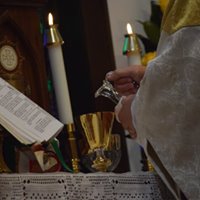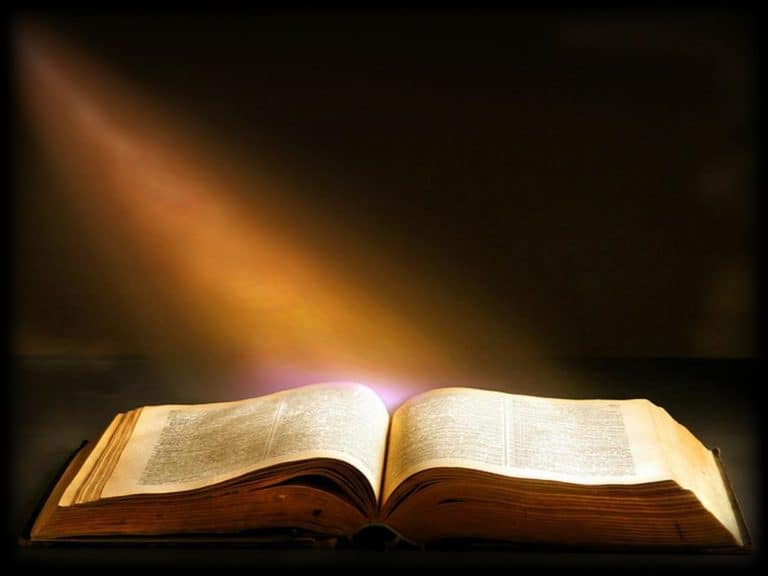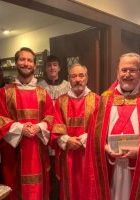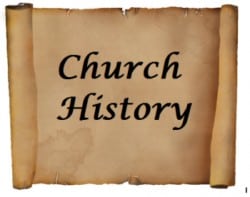Instructional Lord’s Supper through the Gospel Reading
The Order for The Administration of the Lord’s Supper Or Holy Communion
According to the 1928 Book of Common Prayer with Scriptural proofs and explanatory notes
St. Michael the Archangel Matthews, NC 28105 stmichaelsanglican.org
PREPARING FOR OUR SERVICE OF WORSHIP
As a rule, a person’s attention is broken into a thousand fragments by a variety of things. The mind is restless; feelings seek objects that are constantly changing; desires reach out for one thing after another; and the will is captured by a thousand intentions, often conflicting. This is precisely why one should seek composure before he or she worships the Most High God, with one’s heart and mind being fully focused on the here and now, not off on daydreams or the myriad of awaiting tasks and demands, but on the service to be offered unto God. We let go of the past and the future, so that we might grasp hold of God, the eternal I AM, in the present. As C.S. Lewis says in several places, “Where except in the present can the eternal be met. For the present is the point at which time touches eternity” (see Screwtape Letters, annotated ed. HarperOne, 2013).
All of the liturgy is based on the fact of God’s Presence in the church and thus it gives form to man’s response to that Presence. We do not come to church to “attend the service,” which usually means as a spectator, but in order, along with the priest, to offer service to the ever-present God. In order to perform such faithful service to God we must prepare ourselves, giving it our full attention, earnestness, and eagerness, as well as performing it from the heart with all creative energy and presence of mind. Let us then take this time to prepare.
SIMPLE FORMS OF PREPARATION:
Psalm 43 (BCP p.394) or Psalm 84 (BCP p.445)
-or-
ALMIGHTY and Everliving God, grant that we may gladly hear thy Word and receive thy Sacraments, and that all our worship may be acceptable unto thee. Through Jesus Christ our Lord. Amen.
EXHORTATIONS AS A WAY TO PREPARE:
Anyone attending Holy Communion in order to know their Lord experientially as they feed on His Body and Blood should regularly read and meditate upon one or more of the Exhortations (BCP pp.85-89 – they are to be read at least 3 times a year during the Eucharist Service: First Sunday of Advent and Lent 1 and Trinity Sunday,) as part of their preparation for the service.
ENTRANCE HYMN
All stand. A hymn is sung as the processional Cross and procession enter. You might notice several people bow as the Cross passes by; this is out of thanks for all that Jesus did for us on the Cross. We could not come into the Presence of God without the work of the Cross, therefore many bow with grateful hearts. Similarly, when the Celebrant and assisting minister arrive in the sanctuary, they will make a reverence.
The Celebrant stands center at the foot of the Altar and begins:
IMMEDIATE PREPARATION FOR WORSHIP
Priest: In the Name of the † Father, and of the Son, and of the Holy
Ghost.(Matt.18:20) All: Amen. Priest: The Lord be with you. People: And with thy spirit.(2Tim.4:22; cf. Philem.25)
Concerning the opening Salutation: This is more than a Christian greeting. It is an exchange wherein the priest expresses the conviction that the Lord is present with His people (Matt.18:20) as they meet to worship Him in spirit and in truth (Jhn.4:24). In response, the people are to pray specifically that the same Lord will be with the priest’s “spirit” – that is, to pray that the gift of the Spirit given unto him at ordination will be quickened by the Holy Ghost so that he might rightly lead the service and spiritually celebrate the Sacrament for the glory of God and for the salvation and edification of the people.
Priest: Let us pray. ALMIGHTY God, unto whom all hearts are open, all desires known, and from whom no secrets are hid: cleanse the thoughts of our hearts by the inspiration of thy Holy Spirit, that we may perfectly love thee, and worthily magnify thy holy Name. Through Christ our Lord. (see 1Kng.8:39; Ps.24:3-5; Matt.15:19; Heb.10:22) People: Amen.
Concerning drawing near to God from the heart: The goal and aim of Anglican worship is to bring our hearts (our true self) into Holy Communion with God Almighty, the Father, the Son, and the Holy Ghost. Only worship that comes from the heart pleases God and brings the worshiper into everlasting life (cf.Isa.29:13; Matt.15:8; Jhn.17:3).
On cleansing the thoughts of our hearts by the Holy Spirit to love and serve God: When God created us as humans, He formed us with three aspects – our heart, our soul, and our ability – just as we read in The Shema, which is where the greatest commandment comes from: “Thou shalt love the LORD thy God with all thine heart, and with all thy soul, and with all they might” (Deut.6:4). The way of these aspects is as follows:
- Our Heart (Hebrew: Lev) – It is not only the sustainer of physical life (think of the heart attack in 1Sam.25:37), but also the central hub of our intellectual and emotional lives. Today, we think in terms of the brain and the mind, but in the OT all of a person’s intellectual capacities of thinking and making sense of the world happen in the heart. Our heart is our present true self, our conscience, which drives our will and affection.
- Our Soul (Hebrew: Nephesh) – The Hebrew term literally describes the throat, but it is used to describe the whole being of a person as a living, physical organism (since everything required for living passes through the throat). In the Bible people do not have a soul/nephesh, they are a soul/nephesh. Our soul then is our body, our being, our projected image, and, when in rebellion to God, our flesh.
- Our Ability (Hebrew Me’od) – The term literally means “much/very” and, although it doesn’t come across as concrete as we would like it, the word can be understood helpfully as our “muchness” (as in “To whom much is given, of him much will be required,” Lk.12:48). Jesus actually used two words to interpret this one when question about the Greatest Commandment: “mind” and “power” (cf.Mrk.12:30; Matt.22:37) – that is to say everything under a person’s say and authority (our personal kingdom/dominion). In our culture, people are valued in an upside-down way in that what is most important is their ability, then their image, and lastly who they truly are behind closed doors. Biblical faith, however, seeks to restore the right order in our lives and world around us. Biblical faith has everything to do with restoring the heart to communion with Almighty God, which means we must start with the region God has deemed most important – the heart. Redemption starts there (cf. Ezk.11:19; 36:26; Jer.31:33; Heb.8:10). This part of us is the place God offers to restore us by His Holy Spirit. In the beginning He placed eternity, not in our souls, but in our hearts (cf. Eccl. 3:11), and it is at this level that our true self can experience the eternal kind of life in the eternal I Am (cf.Jhn.17:3). This is why most introductions to the Christian faith conclude with having the individual earnestly pray for Jesus, by His Holy Spirit, to enter their hearts. Wisdom resides in the heart (cf. Prov.2:10; 14:33) and it is by the heart that we interpret thoughts and process pain-messages sent from the soul. But without being rooted in God through Jesus and having His Wisdom influencing the thoughts of our hearts, the heart is left unanchored and overwhelmed by misinterpretations of reality. Yet when our hearts are aligned with Him and His will, His truth sets us free to love and serve Him and our neighbor as we were created to do.
The following parts of our Service (The Introit, Collect, Epistle and Gospel Readings) change according to the day, and/or season. The Introit can be found in the St. Michael’s Sunday bulletin. The Collect and Readings can be found in the Book of Common Prayer (pp.90-269).
THE INTROIT (or Entrance Prayer) See Worship Bulletin for Introit of the Day
THE DECALOGUE On the First Sunday of the month the Priest rehearses the Ten Commandments with the people. On all other Sundays, he will only read the Summary of the Law.
It is important to note that God’s people are always to hear every Lord’s Day the Commandments, be it in full (Ex.20:1-17; Deut.5:6-21) or summary (Matt.22:37-40; Lk.10:25-28) form. By their use, opportunity is provided for self-examination, repentance, and amendment of life. From the beginning, God has desired a kind of wholehearted, one-on-one relationship with His people (be it walking with them on the mountain-garden of Eden, Gen.3:8; Ezk.28:14, talking directly to them from the mountain in Sinai, Ex.19-20, walking with them through the mountains of Israel, Gospels of Matt.; Mrk.; Lk.; Jhn., or ultimately living with them in the New heavens and earth, Rev.21). With this in mind we seek to fulfill His desire of having every human serving as a uniquely called priest (cf.Ex.19:4-6; 1Pet.2:9-10). Without this relationship, the Christian religion will devolve into relativistic lip service centered upon fulfilling man’s carnal wants, ignorant of God’s present business in the world, driven by religious leaders called to give them what they want, just like it did when Israel opted for golden-calf worship after being given the Ten Commandments (cf.Ex.32:1-6). Yet, if we live this life, we will actually discover the life we were meant to live from the beginning – a life where the LORD is #1 and every individual is equal. We understand, as Dallas Willard said, the Ten Commandments are not the source of salvation, but they are the course of salvation. If the Holy Spirit is having His way in a person’s life they will be increasingly become the kind of person who naturally does these things. At. St. Michael’s The Decalogue is said during the first Sunday of each month.
Priest: GOD spake these words, and said: I am the LORD thy God; Thou shalt have none other gods but me.
People: Lord, have mercy upon us, and incline our hearts to keep this law.(see 1 Kng.8: 57-58; Ps.119:36; Ezk.36:37)
Priest: Thou shalt not make to thyself any graven image, nor the likeness of any thing that is in heaven above, or in the earth beneath, or in the water under the earth; thou shalt not bow down to them, nor worship them.
People: Lord, have mercy upon us, and incline our hearts to keep this law.
Priest: Thou shalt not take the Name of the LORD thy God in vain. People: Lord, have mercy upon us, and incline our hearts to keep this law.
Priest: Remember that thou keep holy the Sabbath-day. People: Lord, have mercy upon us, and incline our hearts to keep this law.
Priest: Honour thy father and thy mother. People: Lord, have mercy upon us, and incline our hearts to keep this law.
Priest: Thou shalt do no murder. People: Lord, have mercy upon us, and incline our hearts to keep this law.
Priest: Thou shalt not commit adultery. People: Lord, have mercy upon us, and incline our hearts to keep this law.
Priest: Thou shalt not steal. People: Lord, have mercy upon us, and incline our hearts to keep this law.
Priest: Thou shalt not bear false witness against thy neighbor. People: Lord, have mercy upon us, and incline our hearts to keep this law.
Priest: Thou shalt not covet thy neighbor’s house, thou shalt not covet thy neighbor’s wife, nor his servant, nor his maid, nor his ox, nor his ass [donkey], nor any thing that is his.
People: Lord, have mercy upon us, and write all these laws in our hearts, we beseech thee.(Jer.31:33)
If the Decalogue is not said, The priest will say the Summary of the Law
SUMMARY OF THE LAW
Priest: Hear what our Lord Jesus Christ saith: THOU shalt love the Lord thy God with all thy heart, and with all thy soul, and with all thy mind. This is the first and great commandment. And the second is like unto it; Thou shalt love thy neighbor as thyself. On these two commandments hang all the Law and the Prophets. KYRIE ELEISON
Following the reading of the Law, the Kyrie eleison (“Lord, have mercy”) is prayed acknowledging that we have not faithfully kept the Law and that it is only by the Lord’s mercy that we might come into his Presence and worship Him.
Priest: Lord, have mercy upon us. People: Christ, have mercy upon us. Priest: Lord, have mercy upon us.
The Priest then may pray the following Collect, or move directly to the Introit.
Priest: O ALMIGHTY Lord, and everlasting God, vouchsafe, we beseech thee, to direct, sanctify, and govern, both our hearts and bodies, in the ways of thy laws, and in the works of thy commandments; that, through thy most mighty protection, both here and ever, we may be preserved in body and soul; through our Lord and Savior Jesus Christ. All: Amen.
In this optional Collect, now we seek and request that God would not only direct, sanctify, and govern our hearts, but also include our bodies in the process of redemption.
THE COLLECT OF THE DAY
Priest: The Lord be with you. People: And with thy Spirit.(2Tim.4:22; cf. Philem.25) Priest: Let us pray.
See BCP or Worship Bulletin for the Collect of the Day
THE EPISTLE READING Lay Reader: The Epistle is written in the _____ Chapter of _____, beginning at the _____ Verse.
See BCP or Worship Bulletin for Epistle Reading of the Day
Lay Reader: Hear Endeth the Epistle. All: Thanks be to God.
The Priest then offers the Gradual (at St. MIchael’s this is sung by choir as the priest says), Alleluia Tract, or Sequence for the Day, after which the Missal is moved to the “Gospel side” of the Altar.
The Missal is now moved from the Epistle side, or “south side,” of the Altar to the Gospel side, or “north side,” of the Altar – this is a symbolic gesture. Our Service grew out of the Roman tradition, which developed in southern Europe. Therefore, by moving the Missal thus, we symbolize and recall how the Church evangelized the whole of Europe by spreading the Good News north into heathen regions.
READING OF THE GOSPEL
Just as the Word became flesh and dwelt among man, so the Words dwell among us today. This is why the Gospel is often times carried down into the midst of the congregation to be read, or sung, reminding us of this mystery. Priest: The Holy Gospel is written in the _____ Chapter of _____, beginning at the _____ Verse [or, The continuation of the Holy Gospel according to_____ ].
The tradition of St. MIchael’s is to simply say “the Continuation of the Holy Gospel according to St. ….”
All: Glory be to thee, O Lord.
Many will trace the sign of the Cross on their foreheads, lips, and heart as they say, “Glory be to Thee, O Lord,” as the Gospel affects their thoughts, words, and passions in a way pleasing to God.
See BCP or Worship Bulletin for Gospel Reading of the Day
Priest: Here endeth today’s reading of Christ’s most Holy Gospel. All: Praise be to thee, O Christ.





